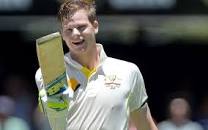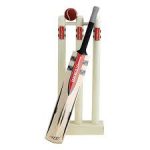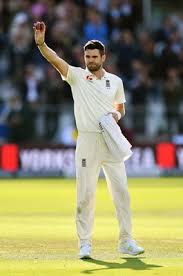SBS again gave TV viewers great access to the Tour de France: 3,366kms in 21 stages; 6-28 July 2019. The winner was Egan Bernal – the first Colombian and the youngest winner since 1909.
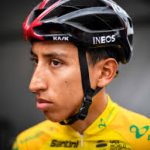
Tadryn was too busy to watch the TdF this year and wondered if I would write a synopsis. Having been busy watching the cricket World Cup, and the women’s soccer World Cup, and Wimbledon – not to mention weekly matches of the Canberra Raiders and Sydney Swans, – I tried not to watch it myself. But the temptation was too great. So I did. Lots.
It was on SBS. In my view the commercial opportunities it offered the broadcaster meant that, this year, there was such a proliferation of ads, marketing linkages, SBS cross-promotions related to it and ancillary activities that, as a piece of TV production, it was sometimes rather irritating. My recollection – perhaps misty-eyed and fond – is that in the old days it used to be a brief introduction by Mike Tomalaris, then 20 minutes to air from Matt Keenan, before settling in for the main course which was four hours with the incomparable Phil Liggett and Paul Sherwen.
Through an interview with a very subdued Phil Liggett, casual observers of the sport like me learned that Paul Sherwen had died of heart failure aged 62. There would be no more, then, of the gentle and expert information provided by Sherwen, with near-perfect French intonation and accent, about the chateaux, forts and natural wonders of the French countryside that passed beneath the aerial cameras in oh so perfectly-timed appearances with the peloton.
Certainly the new team of Matt Keenan and Robbie McEwen grew on me and provided plenty of information, expertise and theatre. For someone so experienced in the job, Mike Tomalaris seemed occasionally to be unsettled or perhaps just poorly produced: he sometimes seemed unsure of what was coming next or its timing or of his lines. Many of his pieces to camera were done jointly with ‘Macca’, who spoke well and pleasantly, sometimes giving the opportunity for Mike to catch up with the program’s live schedule
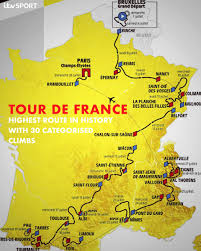
This year’s was the 106th edition of The Tour. It started on 6 July in Brussels with 176 riders in 22 teams. One of the first things one notices year-on-year is the rapid turnover in the names of the teams. Some of this year’s were familiar to me, like Movistar, AG2R, Lotto-Sudal, Astana, Quick-Step and Dimension Data, but I have no idea of their nationality or commercial basis.
There is no more Sky, with that enormously well-funded team now working for Ineos. It strikes me as quite odd that, given the amount of money spent at the Tour by Ineos – which I assume is a brand of some sort – at no stage during the 21 days did I hear mention of what Ineos is or does; and the same applies for the other brands.
I came to the start line with some obvious special interests. Richie Porte, from Tasmania, was the GC rider for Trek-Segafredo. The Australian team, now called Mitchelton-Scott (still sponsored by Gerry Ryan who I’m told is a lovely man) included the two Yates twins from Manchester, with Simon Y. being the GC candidate. Then there was Geraint Thomas, last year’s winner (“overweight at the start of the 2019 season”) and, following Chris Froome’s dreadful crash a couple of weeks out from the Tour, now surely categorically GC leader for Ineos. (At that stage I knew nothing of Egan Bernal.) There was also the sprinter Michael Matthews (‘Bling’) whose dad is a butcher in Canberra.
I had seen some of the precursors to the Tour, such as Paris-Roubaix, and watched some of this year’s Giro, in which Richard Carapaz, Vincenzo Nibali and Primoz Roglic finished one, two and three. (Paris-Roubaix is The Hell of The North: 257 kilometres that includes 29 cobbled sectors (pavé) spread across 54.5 kilometres. Winning time: a tick under 6 hours!!)
Favourites for the General Classification (GC) included Romain Bardet (second in 2016 and third in 2017) and Thibaut Pinot (both carrying the deadweight of the expectations of France, which last won it in 1985!), Jakob Fuglsang, Steven Kruijswijk, Mikel Landa (fourth overall when riding one year for Froome), Nibali and Nairo Quintana. One of my personal favourites is Movistar’s Alejandro Valverde (39 years) – a sort of Marcus Trescothick of the cycling classics. Tom Dumoulin, second last year, was out injured and Cav wasn’t picked by his team (twitch muscles must have deteriorated). Peter Sagan was saddling up to win the green jersey for a record seventh time. (Robbie won it three times.)
By the time I was paying proper attention there had been couple of bunch sprints, with young Australian Caleb Ewan in the first three in both but not having won a cigar. The commentators were excited by Stage 1 in which Mike Teunissen was in the lead-out train for Dylan Groenewegen. When the latter crashed with 2km to go, Teunissen was free to go for broke – and he did, and he won.
Julian Alaphilippe – apparently known to his growing number of French fans as Lulu – won the third stage and the yellow jersey with a solo attack off the front of a breakaway. He lost the jersey next day but then won it back and, with his popularity growing as his wings were sprouting, retained it right up until stage 19. Most unexpected was his victory in the individual TT over much more fancied specialists – attesting, we were again told, to the magic effect of having yellow on one’s back.
The first significant impact on leading GC contenders was on stage 6 when Nibali, Porte and Bardet all lost time. One felt sorry for Richie who, when interviewed regularly of a morning by the SBS crew, had to remain positive and matter-of-fact and uncomplaining – which he did with considerable good grace.
Stage 8, which had 4000m of elevation gain, saw Thomas De Gendt staying off the front for what was a very popular win. The next day saw Daryl Impey win the first of four stages for Mitchelton-Scott. One thought how both Phil Liggett and Paul Sherwen, with their own African connections, would have enjoyed Impey’s success.
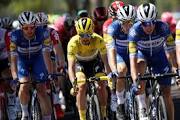
Stage 10 was an example of how a crosswind on an apparently easy (!!) stage can have a major effect. With 30kms to go splits appeared in the peloton and Team Ineos, presumably because they were better organised or more alert or in better communication, started riding hard to build their advantage. Those who were caught out and lost chunks of time included Pinot, Porte, Rigoberto Uran, Fuglsang and Landa. In terms of the GC podium, their goose was cooked after this Stage. Those who prospered as a result of this day included Geraint Thomas, Egan Bernal, Bardet and Alaphilippe – who continued to confound all doubters by retaining the yellow jersey for fourteen days.
By this time Peter Sagan was quite a way ahead of Michael Matthews in the sprinters’ green jersey competition.
Stage 11 saw the breakaway caught with 5 km to go, before Caleb Ewan finally won his first sprint. Apparently he was nominated to ride the Tour for Mitchelton-Scott in 2018 but was omitted at the last minute; thus his transfer to Lotto-Soudal as the Team’s nominated (and looked-after) sprinter.
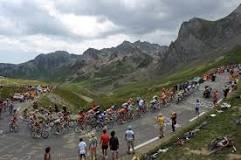
The 12th stage was the first in the Pyrenees. Simon Yates, as if making up for his brother’s slide away from GC success, won after a long breakaway by a big group. It was at a feeding station in this Stage that Rohan Dennis mysteriously abandoned – the day before the individual TT for which (as World Champion) he was favourite.
That TT was a standout triumph for LuLu, not fancied as a time triallist, with Geraint Thomas second at 14 seconds down. During the TT there was an awful crash when Wout van Aert got too close to a barrier and ripped his leg muscles open. Horrible to see.
Stage 14 was the one in which Thomas lost some time to his team-mate Bernal. By this time casual followers of the sport like me had heard enough about him from commentators to understand what a terrific young talent he is. In the lead-up to the Tour he won three World Tour one-week races: the Amgen Tour of California, Paris-Nice, and the Tour de Suisse.
Meanwhile, the French audience (nation, probably) were getting revved up by the fact that Alaphilippe was exceeding all expectations, giving rise to the possibility, still unlikely, that he could do well enough in the Alps to win overall. But what seemed more likely was that Pinot would keep rising in the GC rankings and, as a tried and tested climber, prevail overall for a French triumph in Paris.
This, almost unbearably for any viewer, never mind for the French, was of course the making of tragic events four days later. On the second day in the Pyrenees Pinot won and on the third he finished second to Simon Yates. This put Pinot in fourth spot overall. Caleb Ewan won the bunch sprint on the transitional Stage to the Alps, perhaps enjoying that day’s Bowral-like heatwave. Thomas crashed again, and Fuglsang crashed and had to abandon. At this point Bardet, the other main French GC hope, who had a particularly bad day on Stage 14 and dropped out of contention for a GC podium spot, was eleventh in the King of the Mountains.
Trentin won the second transitional stage, making it four for Australia’s Mitchelton-Scott team. Luke Rowe, Geraint’s Welsh buddy and Ineos domestique, had a bit of argy-bargy with Tony Martin and both were expelled from the race. All we saw on the TV was a brief coming-together but apparently there was more we didn’t see which justified what many felt was a harsh decision.
And so to the Alps. Could Alaphilippe possibly hang on? Would Pinot continue his charge to the top? The answers were ‘No’ and ‘No’.
Alaphilippe seemed to be cooked on one of the climbs in Stage 18 and it was now obviously a qestion of whether he could keep a spot on the podium. Everone hoped he would. Nairo Quintana, Movistar’s leader, had been under-performing and was in effect criticised by his team-mates for lack of condition. However he won Stage 18, the first in the Alps. Bernal gained a small amount of time on other GC favourites. Speculation mounted about whether Thomas would ride for him over the next two days. He did.
Early on in Stage 19 it became clear that Pinot was done for. The French TV producer gave all of us looking on plenty of vision of Pinot in pain, Pinot being distanced, Pinot in tears and being comforted by team-mates while still slowly climbing, and then, finally, Pinot climbing into the team car.
With one descent and then one final climb to go, Bernal was leading the stage with Simon Yates second. Because he is such a good descender, the question was how much time would Alaphilippe make up on the Stage leaders. I think almost everyone watching thought that he would get back seconds on the descent but lose minutes on the final climb. But we’ll never know; way down ahead of the dry descent the leaders were on there was a sudden mud-slide, and snow and ice on the road, and a snowplough pushing aside water and ice. The race was ‘neutralised’ with everone given the time they had at the top of the previous climb. The yellow jersey passed to Bernal.
The next Stage was also shortened because of the weather and road conditions. The ‘ageless’ and popular Vincenzo Nibali won off the front. The GC contenders followed him together close behind, with Alaphilippe being dropped again and slipping from second overall to fifth.
All was not lost however for the French: by being close to the front on several of the scored climbs in the Alps, Romain Bardet came from way back to win the Polka Dot jersey. Caleb Ewan made it three with his sprint win on the Champs-Élysées.
Egan Bernal, 22-year-old Colombian, became the youngest winner since 1909, the first Latin American winner ever, and the fifth rider to win both the general and young rider classifications in the same year.
Thomas was second overall, with Kruijswijk third. Sagan won a record seventh points classification, with Ewan second. Movistar won the team classification (the best three riders per team on each stage). Julian Alaphilippe won the overall super-combativity award. How could he not.
As usual, the scenery was inspirational (“must go see it again”.) The level of human endeavour still astounds; average speeds on bumpy Stages of over 45 kph; someone did 100kph somewhere along the way. The teamwork – now that one understands it better – is rich in sporting meaning and poignancy (the poor sprinter who couldn’t keep on the wheel of his last lead-out rider coming along by the Place de la Concorde!). It is of course very commercial and TV viewers pay some of the price. But it is so worth staying up and around for!
Vive le Tour indeed!
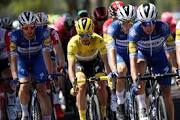
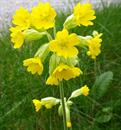
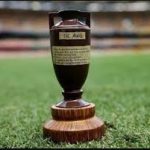 Let me try my hand at cricket prognostication.
Let me try my hand at cricket prognostication.